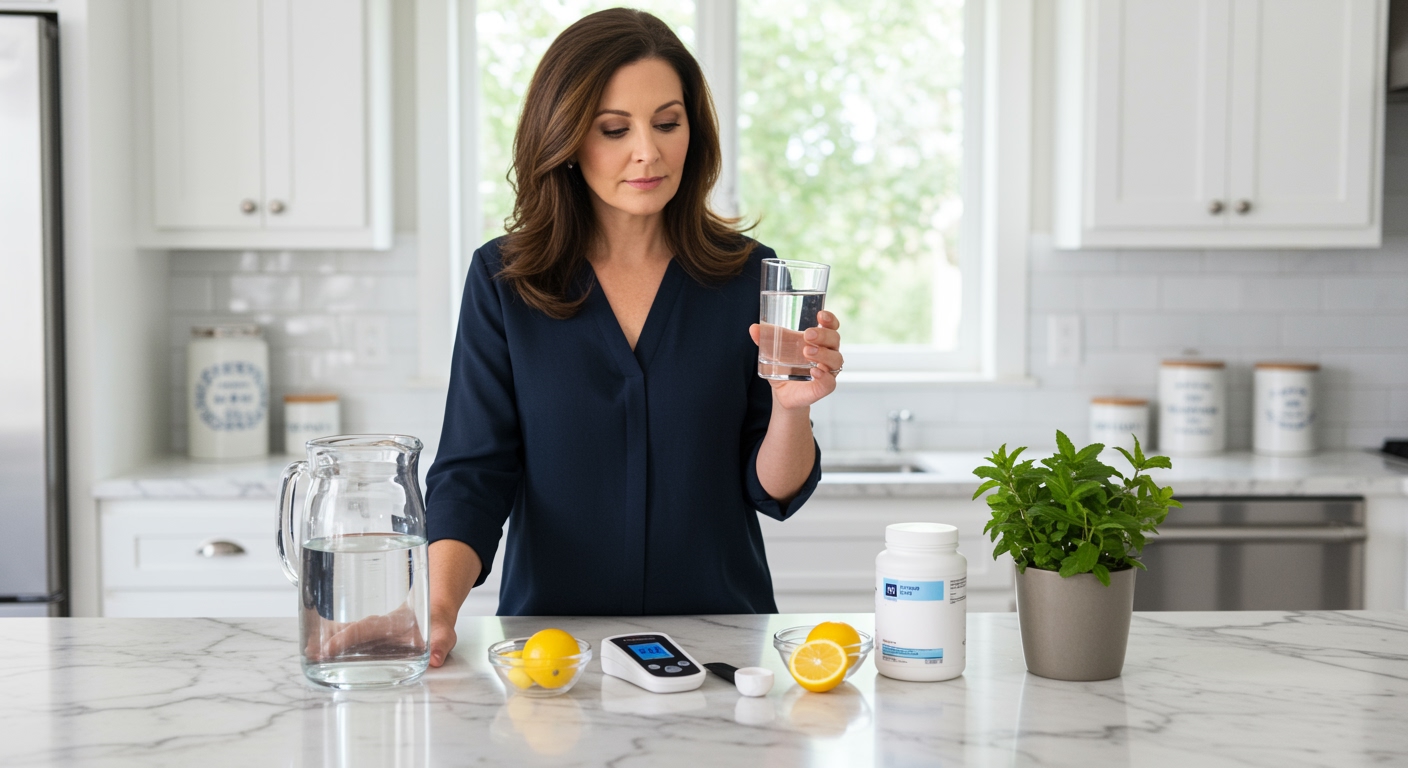✪ Key Highlight: Medical experts confirm alkaline water provides no proven health benefits over regular tap water for most people.
Introduction
Summer heat drives millions of people toward expensive specialty waters promising miraculous health benefits.
New medical analysis reveals that alkaline water and electrolyte drinks may not deliver the transformative results their marketing campaigns promise.
Hi, I’m Abdur, your nutrition coach and today I’m going to analyze the latest expert findings about whether alkaline water actually provides superior hydration compared to regular tap water.
Does Alkaline Water Actually Change Your Body pH?
Dr. Niket Sonpal, a New York-based internist and gastroenterologist, delivers a clear verdict about alkaline water claims.
He states there is no scientific evidence that drinking alkaline water will significantly change your body’s pH or provide major health advantages.
Your kidneys and lungs already work continuously to maintain your blood pH within a tight, healthy range between 7.35 and 7.45.
This natural buffering system is so powerful that it neutralizes any pH changes from food or drinks within minutes.
Companies marketing alkaline water often claim it can neutralize acid in your body, but your physiological systems already handle this process automatically.
Even if you consumed highly acidic or alkaline substances, your body would quickly restore normal pH levels through respiratory and renal compensation mechanisms.
✪ Fact: Your body maintains blood pH so precisely that even tiny changes outside the normal range can be life-threatening.
When Does Electrolyte Water Actually Help?
Registered dietitian nutritionist Roxana Ehsani explains that electrolyte-enhanced water can help replace sodium, potassium, and other minerals lost in sweat.
This becomes especially useful for people who exercise for more than an hour, work outdoors in hot conditions, or experience frequent muscle cramps.
During intense physical activity, your body loses significant amounts of sodium and potassium through sweat production.
These electrolyte minerals help maintain proper muscle function, nerve transmission, and fluid balance within your cells.
However, for most people engaging in normal daily activities, regular water consumption provides adequate hydration without additional electrolyte supplementation.
You can also replace lost electrolytes through whole foods like bananas, oranges, or yogurt rather than purchasing expensive specialty waters.
✪ Pro Tip: Save money by eating a banana and drinking regular water instead of buying electrolyte drinks for light exercise.
What Does Limited Research Actually Show?
A small 2018 study published in PLoS One found that athletes who drank alkaline water showed better hydration markers compared to those drinking regular water.
However, this study involved only a small number of participants and focused specifically on intense athletic performance.
Dr. Sonpal emphasizes that the benefits of alkaline water are not proven for the general public and unnecessary for most people.
The study’s findings cannot be generalized to everyday hydration needs for people who are not elite athletes.
More comprehensive research involving larger, diverse populations is needed before making any definitive claims about alkaline water benefits.
Current scientific consensus supports that regular water meets hydration requirements for the vast majority of healthy adults.
✪ Note: One small study does not establish scientific proof, especially when larger studies show conflicting results.
Are There Safety Concerns With Specialty Waters?
People with certain health conditions, particularly kidney disease, need to exercise caution when consuming water with added minerals or high pH levels.
Dr. Sonpal warns that if you have kidney problems, too much potassium or high-pH drinks could be potentially dangerous.
Damaged kidneys cannot effectively filter excess minerals from your bloodstream, leading to dangerous accumulation of substances like potassium.
Hyperkalemia, or elevated blood potassium levels, can cause irregular heart rhythms and other serious cardiac complications.
Additionally, consistently consuming high-pH water might interfere with your stomach’s natural acid production needed for proper digestion.
Always consult your doctor before making significant changes to your hydration routine, especially if you have underlying medical conditions.
✪ Pro Tip: Check with your healthcare provider before trying specialty waters if you take medications or have chronic health conditions.
What About Cost and Environmental Impact?
Dr. Sonpal points out that bottled water, including alkaline and electrolyte varieties, can be expensive and create significant plastic waste.
In most cities, tap water is safe and provides essential minerals without the environmental cost of plastic packaging.
Municipal water systems undergo rigorous testing and treatment to meet federal safety standards established by the Environmental Protection Agency.
If you have concerns about your local water quality, experts suggest checking your annual water report or using a home filtration system.
Home filtration can remove chlorine taste and potential contaminants while maintaining beneficial minerals at a fraction of bottled water costs.
The marketing hype surrounding specialty waters often exploits consumer anxiety about health while providing minimal additional nutritional value.
✪ Fact: Americans spend over 1,000 times more per gallon on bottled water compared to tap water for essentially the same hydration benefits.
The Bottom Line
Medical experts agree that regular tap water provides adequate hydration for most healthy adults without the need for expensive specialty alternatives.
The best water for your health is the one you will consistently drink every day, not the one with the fanciest marketing claims.
What are your thoughts on alkaline water versus regular tap water, and have you noticed any differences when switching between different types of water for hydration?
References
At NutritionCrown, we use quality and credible sources to ensure our content is accurate and trustworthy. Below are the sources referenced in creating this article:
- Quench Culligan: What is Alkaline Water
- WebMD: What is Alkaline Water
- National Center for Biotechnology Information: Alkaline Water Research
- Healthline: Alkaline Water Benefits and Risks
- Mayo Clinic: Alkaline Water Expert Answers





